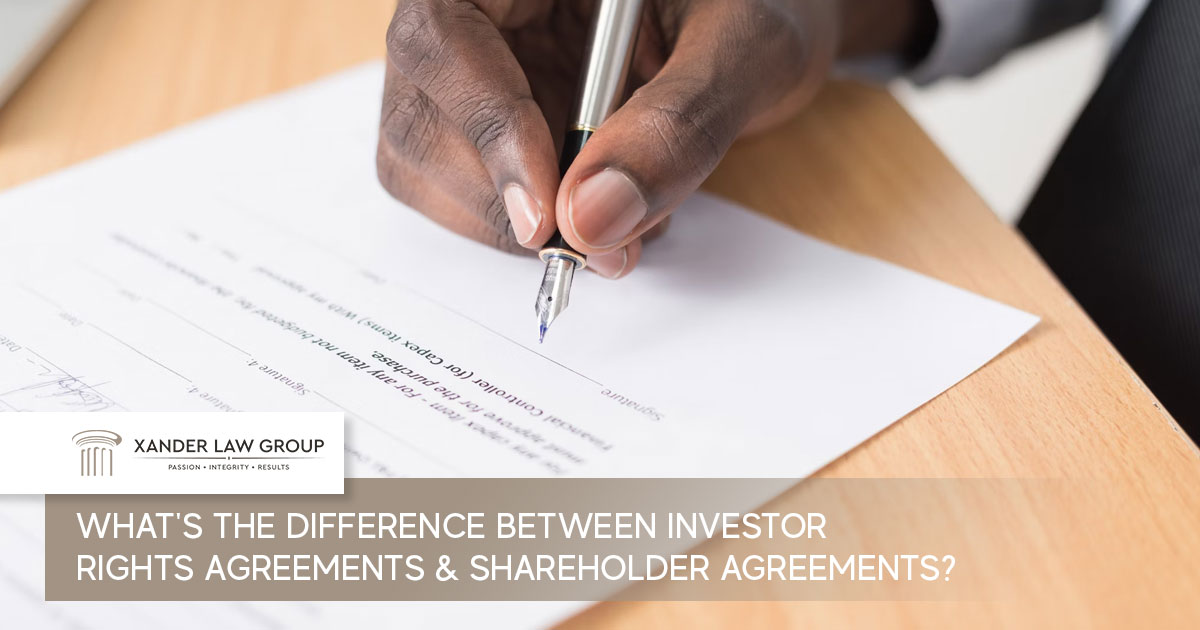What’s The Difference Between Investor Rights Agreements and Shareholder Agreements?
- What is a Shareholder Agreement?
- What is an Investor Rights Agreement?
- Difference Between a Shareholder Agreement and an Investor Rights Agreement
- Why Do You Need an Investor Rights Agreement?
- Why Do You Need a Shareholder Rights Agreement?
- When to Choose a Shareholder Agreement
- When to Choose an Investor Rights Agreement
- Ask a Corporate Attorney Before You Decide
In this article, we aim to explain the difference between two essential legal agreements in the corporate world: Shareholder Agreements and Investor Agreements.

A shareholder agreement serves as a vital tool for a company, serving the primary purpose of defining the rights of its shareholders. Its key objective is to establish and formalize the relationship between the company and its shareholders.
Shareholders have a right to vote on important issues, such as the election of new directors and the approval of significant changes in the company’s operations, such as selling the company or issuing stock options.

What is an Investor Rights Agreement?
An investor rights agreement serves as a framework to outline the rights of investors. This agreement outlines the extent to which an investor can withdraw funds from the business, specifies their investment portfolio, and defines their voting privileges.
In most cases, investors who own stock in a company possess a percentage of the total number of shares corresponding to their investment in the company. This percentage usually aligns with the amount of money invested by the investor.
When comparing a Shareholder Agreement to an Investor Rights Agreement, it’s important to note that neither prevents you from investing in a business. However, the Investor Rights Agreement is more specific about the types of investments allowed and how the investment capital can be utilized by the company. The Shareholder Agreement, on the other hand, primarily governs the relationship between your investment and ownership in the company.
Why Do You Need an Investor Rights Agreement?
An Investor Rights Agreement can be used to safeguard against fraud and embezzlement. While many companies have a written Shareholder Agreement, not all possess an Investor Rights Agreement. To protect themselves from fraudulent practices, it is beneficial for investors to include an Investor Rights Agreement alongside a written Shareholder Agreement as part of their investment.
A shareholder rights agreement proves valuable in shielding shareholders from fraudulent business transactions. Many companies try to evade dividend payments to their shareholders, often to minimize tax liabilities. Investors can utilize the Investor Rights Agreement to prevent the company from issuing dividends that are not paid out in full. Investors may also use the Investor Rights Agreement to prevent the company from taking actions that would dilute the value of their investment in the business.
Determining when to opt for a Shareholder Agreement versus an Investor Rights Agreement hinges on your specific circumstances. A Shareholder Agreement is very similar in concept to a Partnership Agreement and is suitable when you intend to invest in a company without assuming personal liability for its debts or legal disputes. It safeguards against losses in the event of the company’s insolvency, particularly if you’re acquiring stock from other investors or distributing profits through dividends and stock splits.
When to Choose an Investor Rights Agreement
An Investor Rights Agreement can protect you from fraud and embezzlement by the company but may not provide the same level of protection against financial losses or personal liability. It is typically used when you already own stock in a company and want to add additional investments or make significant changes to your investment.

Ask a Corporate Attorney Before You Decide
Before embarking on the creation and utilization of either document, it is wise to seek guidance from a business law attorney. The Xander Law Group is well-equipped to assist you in navigating this complex terrain.
Don’t hesitate to contact our Miami law office to schedule a consultation with one of our experienced team members to review your specific needs.








